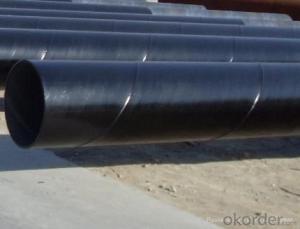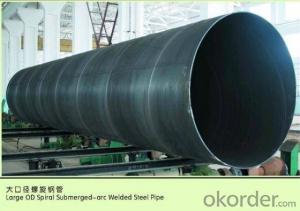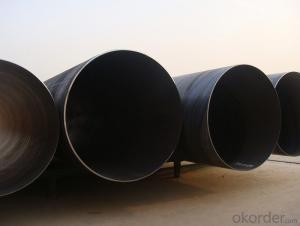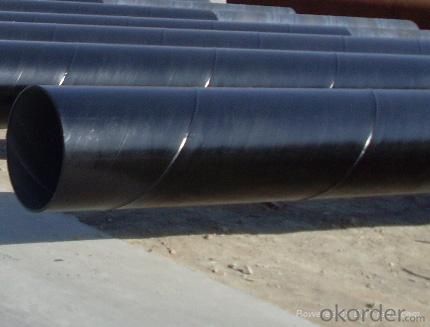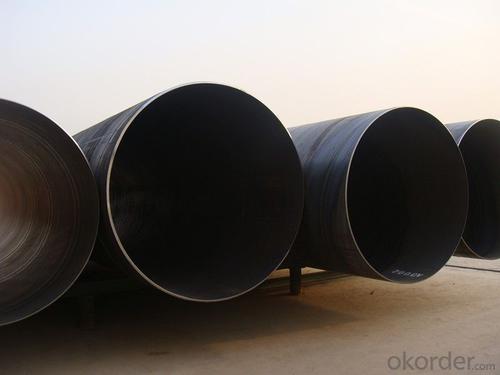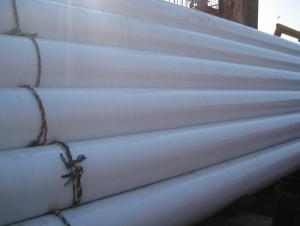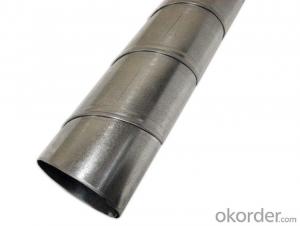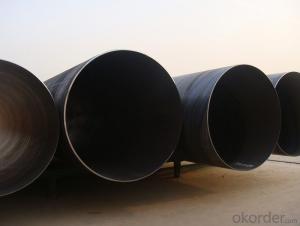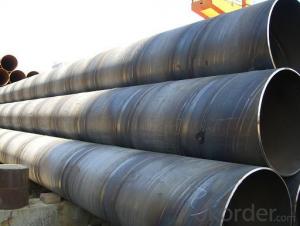SPIRAL STEEL PIPE 16‘‘-48’‘
- Loading Port:
- China Main Port
- Payment Terms:
- TT OR LC
- Min Order Qty:
- -
- Supply Capability:
- -
OKorder Service Pledge
OKorder Financial Service
You Might Also Like
Packaging & Delivery
Packaging Detail: | standard export packing or as customer's requirement |
Delivery Detail: | within 10 - 30 days |
Specifications
Spiral Welded Steel Pipes and Tubes
1.Material:Q195-Q235
2.Length:1-12m
3.WT:1.0-14mm
4.O.D.:20-273mm
Spiral Welded Steel Pipes and Tubes
Product Description:
1.Material : Q235,Q345,L245,L290,L360,L415,L450,L485,GrB,X42,46,X52,X56,X60,X65,X70,X80,X100
2,Standard: SY/T5037-2000,GB/T9711-2011,API Spec 5L PSL1/PSL2,ASTM A252\A53,ISO3183,DIN17172,EN10217,JIS G3457,AWWA C200,ASTM A139,ASTM A671,ASTM A672
3.Wall thickness: 3.0mm-30mm
4.Outer diameter: φ168mm-3020mm
5,Length: 5m-12m or as your requirement
6,Corrosion protection standard: DIN30670,DIN30671, AWWAC210, AWWA C203, SY/T0413-2002,SY/T0414-2002
7,Application: Oil, gas, natural gas, water pipe, thermal electricity pipe, steel structure engineering, etc
Q195-q345 Material Steel Pipe's Materials
Elements | Chemical Compsition% | Mechanical Property | ||||||
| C% | Mn% | S% | P% | Si% | Yield Point (Mpa) | Tensile Strength(Mpa) | Elongation |
Q195 | 0.06-0.12 | 0.25-0.50 | <0.050 | <0.045 | <0.030 | >195 | 315-430 | 32-33 |
Q215 | 0.09-0.15 | 0.25-0.55 | <0.05 | <0.045 | <0.030 | >215 | 335-450 | 26-31 |
Q235 | 0.12-0.20 | 0.30-0.70 | <0.045 | <0.045 | <0.030 | >235 | 375-500 | 24-26 |
Q345 | <0.20 | 1.0-1.6 | <0.040 | <0.040 | <0.55 | >345 | 470-630 | 21-22 |
- Q: Can steel pipes be used for architectural purposes?
- Yes, steel pipes can be used for architectural purposes. They are widely used in the construction industry for structural applications such as building frames, handrails, fences, and decorative elements. Steel pipes offer strength, durability, and versatility, making them suitable for various architectural designs and applications.
- Q: What is the difference between steel pipes and PVC pipes?
- The main difference between steel pipes and PVC pipes lies in their material composition. Steel pipes are made of a durable and strong metal alloy, while PVC pipes are made of a lightweight and flexible plastic called polyvinyl chloride. Steel pipes are typically used for heavy-duty applications that require high strength and resistance to extreme temperatures and pressure, such as in industrial settings or for transporting liquids or gases over long distances. On the other hand, PVC pipes are commonly used for residential and commercial plumbing systems due to their affordability, ease of installation, and resistance to corrosion. Additionally, PVC pipes are not suitable for high-pressure applications and have a lower heat tolerance compared to steel pipes.
- Q: What are the different methods of inspecting steel pipes for defects?
- There are several methods of inspecting steel pipes for defects, including visual inspection, magnetic particle inspection, ultrasonic testing, radiographic testing, and eddy current testing. Each method has its own advantages and limitations, and the choice of inspection method depends on factors such as the type of defect being searched for, the size and shape of the pipe, and the desired level of accuracy and sensitivity.
- Q: How do you calculate the bending moment of a steel pipe?
- To calculate the bending moment of a steel pipe, you need to consider both the applied load and the structural properties of the pipe. The bending moment is a measure of the internal forces within the pipe caused by the applied load. The bending moment can be calculated using the following equation: Bending Moment = Load x Distance Here, the load represents the external force acting on the pipe, and the distance is the distance from the point where the load is applied to the point where the bending moment is being calculated. In order to accurately calculate the bending moment, you must also consider the properties of the steel pipe. This includes the pipe's cross-sectional area, second moment of area (also known as the moment of inertia), and the modulus of elasticity. The second moment of area reflects the pipe's resistance to bending and can be calculated based on the dimensions of the pipe's cross-section. The modulus of elasticity represents the pipe's stiffness and can be obtained from material properties data. Once you have determined the load, distance, cross-sectional area, moment of inertia, and modulus of elasticity, you can plug these values into the bending moment equation to calculate the bending moment for the steel pipe. It is important to note that the calculation of bending moment assumes linear elastic behavior, which means that the pipe does not exceed its elastic limit and does not undergo plastic deformation. If the pipe is subjected to loads that exceed its capacity, the calculation of bending moment may not accurately represent the actual behavior of the pipe. In such cases, it is advisable to consult with a structural engineer or use more sophisticated analysis methods to accurately assess the bending moment.
- Q: What are the different methods of joining steel pipes for high-pressure applications?
- There are several methods of joining steel pipes for high-pressure applications. These include butt welding, socket welding, threaded connections, and flanged connections. Butt welding involves joining the ends of two pipes by heating them and then pressing them together to create a strong and seamless connection. Socket welding involves inserting one pipe into the socket of another and then welding them together. Threaded connections involve screwing together two pipes using threaded fittings. Flanged connections involve using flanges to connect two pipes by bolting them together with gaskets to ensure a tight and leak-free joint. Each method has its own advantages and is chosen based on the specific requirements of the high-pressure application.
- Q: What are the factors that affect the lifespan of steel pipes in different environments?
- The factors that affect the lifespan of steel pipes in different environments include the presence of corrosive substances, such as chemicals or saltwater, which can corrode the steel and lead to degradation over time. Other factors include temperature fluctuations, which can cause expansion and contraction of the steel, leading to stress and potential cracking. The quality of the protective coating on the pipes also plays a role, as a strong and durable coating can provide better resistance against corrosion and prolong the lifespan of the pipes. Additionally, the maintenance and regular inspection of the pipes, including cleaning and repairs, can help identify and address any issues early on, preventing further damage and extending their lifespan.
- Q: How are steel pipes insulated to prevent freezing?
- Steel pipes are insulated to prevent freezing by wrapping them with insulation materials such as foam or fiberglass, which helps to maintain the temperature of the pipe and prevents the transfer of cold air. Additionally, pipes can be buried underground below the frost line to protect them from freezing temperatures.
- Q: What is the difference between standard wall thickness and extra-strong wall thickness steel pipes?
- The main difference between standard wall thickness and extra-strong wall thickness steel pipes lies in their thickness and durability. Standard wall thickness pipes have thinner walls and are suitable for most general applications, while extra-strong wall thickness pipes have thicker walls and are designed for heavy-duty or high-pressure applications. These extra-strong pipes offer enhanced strength and resistance, making them more reliable and suitable for handling extreme conditions or demanding projects.
- Q: What are the different joining methods for steel pipes?
- There are several joining methods for steel pipes, including welding, threaded connections, flanged connections, and mechanical couplings. Welding involves melting the ends of the pipes and fusing them together using heat. Threaded connections involve screwing the pipes together using threaded ends. Flanged connections use flanges that are bolted together to connect the pipes. Mechanical couplings use a variety of methods such as compression fittings or grooved couplings to connect the pipes without welding or threading.
- Q: Can steel pipes be used for conveying corrosive substances?
- Steel pipes can be used for conveying corrosive substances, but it is important to choose the right type of steel and consider additional protective measures. Stainless steel pipes, for example, are highly resistant to corrosion and can handle a wide range of corrosive substances. However, it is crucial to consider the specific corrosive properties of the substance being conveyed and the concentration levels. In some cases, additional protective coatings or linings may be necessary to prevent corrosion and ensure the longevity of the steel pipes. Regular maintenance and inspection are also essential to detect and address any signs of corrosion to prevent leaks or failures in the piping system. Overall, steel pipes can be used for conveying corrosive substances, but proper material selection, protective measures, and maintenance are vital to ensure safe and efficient operations.
Send your message to us
SPIRAL STEEL PIPE 16‘‘-48’‘
- Loading Port:
- China Main Port
- Payment Terms:
- TT OR LC
- Min Order Qty:
- -
- Supply Capability:
- -
OKorder Service Pledge
OKorder Financial Service
Similar products
Hot products
Hot Searches
Related keywords
